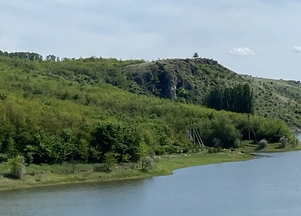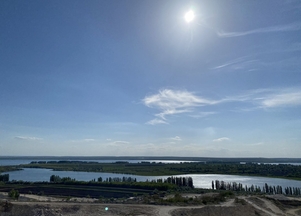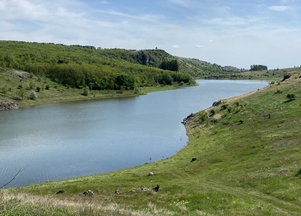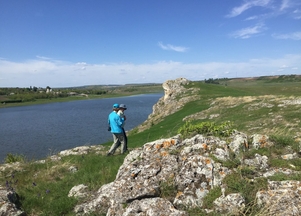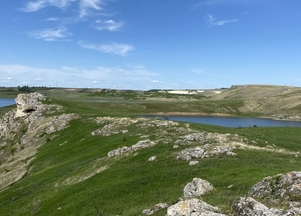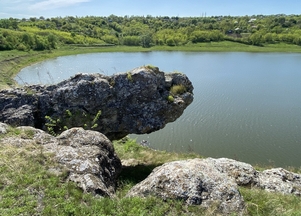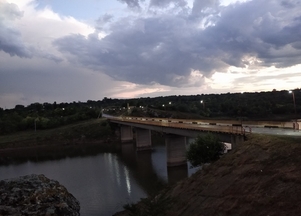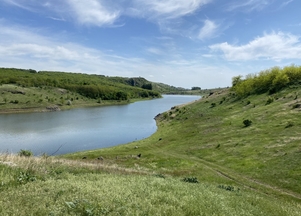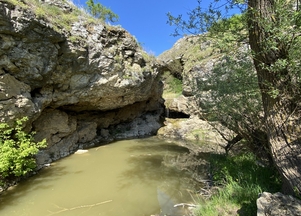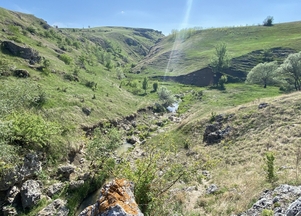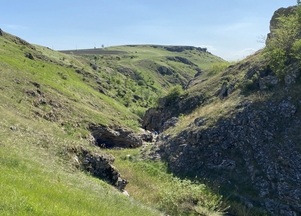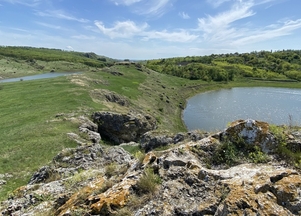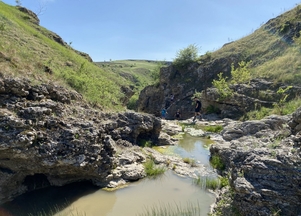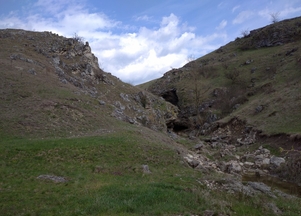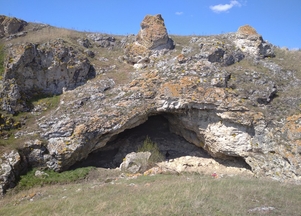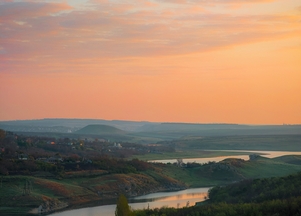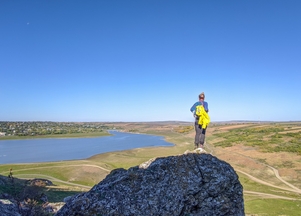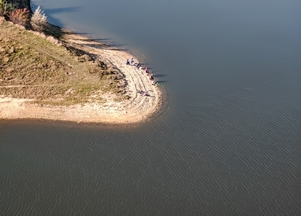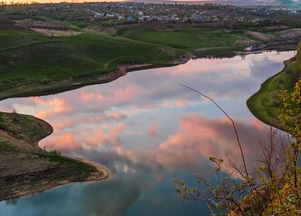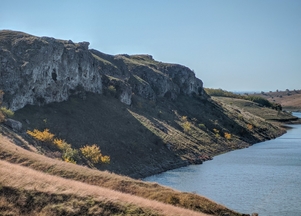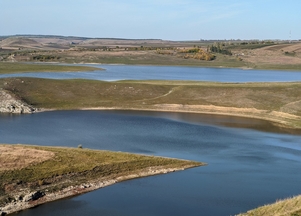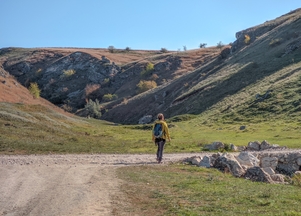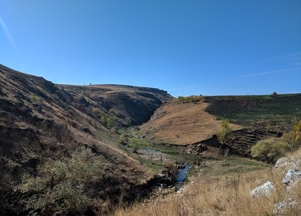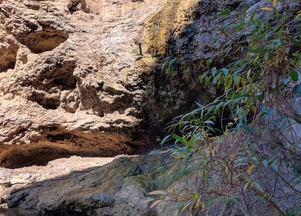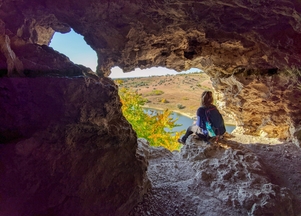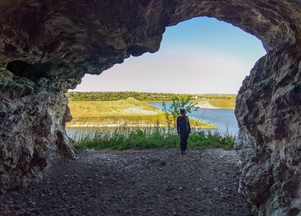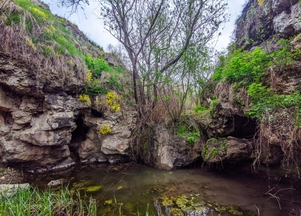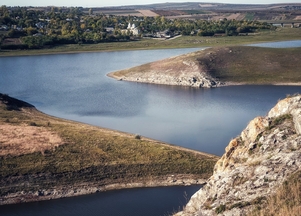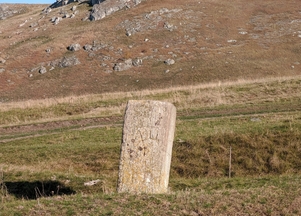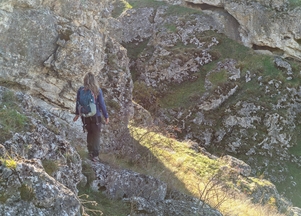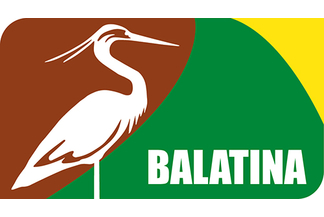Văratic
History
In the north of the Republic of Moldova, in Riscani district, on the Ciuhur river (a tributary of the Prut river) the village of Văratic is located.
The village has its origins in 1613. The name of the village comes from the word "Vărat", because herds of cattle used to come here to herd with the herdsmen of the Stroiești lords. Their estates stretched from Lipcani to Glodeni, Tarnova, Glava, Balti.
The first settlements were huts, and later on shacks. After that, small houses began to be built, covered with reeds. The first settlements were on the left bank of the Ciuhur, around the old cemetery, according to the inscriptions on the tombstones written in Romanian using Slavonic script. These inhabitants had the family names of Gangur, Mihai, Savanu. After the battles of Stălinești on the Prut (1711), the village was destroyed.
Then the inhabitants began to build houses on the right bank of the Ciuhur, and the Turks lived for some time in the courtyard of the village's landlord. The village was given a Turkish name - Tărăbușeni. At the time of the tax collections by the Turks and the oppressing landlords, some of the inhabitants of the village of Văratic fled to a "better" landlord in the village of Hăsnășenii-Mari, Balti district.
Around 1807-1808, the court of the nobleman Gavriil Galagan appeared in the village. In the village there were about 100-130 small, thatched peasant houses. In 1828-1830, more than half of the inhabitants of the village died of cholera and plague.
1866 - the popular school of the Ministry of Public Education was opened.
1875 - peasants were obliged to attend the church, which was built in 1822.
1892 - the landowner M. Rîșcan owned 520 ares of land in Văratic. Squire D. Galagan - 383 ares.
1893 - the local farmer Simion Miron built a house and sold it to the village for 7000 rubles. In the school 12-15 children of the landlords and priests of the Văratic, Horodiște, Cuconeștii Vechi, and other villages were educated.
1896 - the post office had 9 horses.
1904 - the village had 158 houses and 1120 souls.
1909-1911 Stolâpin's reform. Many peasants were ruined, selling their land to the new "young landlords” of the village - Gheorghe Pleșca, Dumitru Motelică, Simion Miron, who had 50-70 hectares of land each.
1911 - the first construction of the Sculeni-Bratușeni telephone line, which was to pass through Văratic.
1913 - A one-room, one-classroom school with one teacher was opened. It was maintained by monastery funds.
It was not until the Soviet period that the village of Văratic, on the basis of the native "October" collective farm, began to build household and social-cultural buildings: farm buildings, school, hospital, shop, post office, mill, park, stadium, baths, etc. The first brigades and farms for poultry, pigs, cows and horses were established.
The entire appearance of the village has changed. Instead of small houses covered with reeds and thatch, modern, large-glazed, tiled houses were built.
In 1945 the clubhouse, the library were built. The first head of the club and library in the village was Șalaru Agafia.
In 1946 the 7-year school opened. The first class graduated in 1949. Later (in 1957) the 10-year school opened.
The first man with higher education was Rujina Liudmila, b. 1955. Shalari Vasilii is the first from the village to become a doctor of biological sciences. The first teacher in the village of Văratic was Shalaru Pavel.
After the construction of the Costești Hydropower Plant (1972-1978), part of the village (346 households) and public buildings were rebuilt above the village, sheltered from the flood zone.
In 1980, the school with 624 places, the kindergarten with 280 places, the bridge over Ciuhur were built.
Since 1978, the collective farm has been transformed into a fruit production enterprise.
Beautiful places
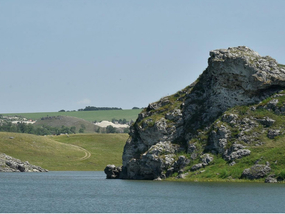
"The Țiglău Cliff"
The cliff is bathed on two sides by the waters of the Ciuhur and shelters on the northern side a rather deep cave, called "Odaia" (Room) by the locals. Until 1978, the Ciuhur river used to meander past this cliff in its usual bed.
Read more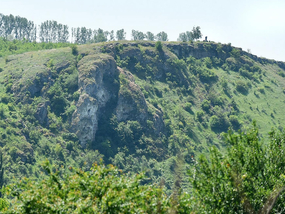
The Lovers' Rock
"The Lovers' Rock" has a very interesting and tragic history. It is over 50 metres high and stands on the left bank of the Ciuhur River.
Read more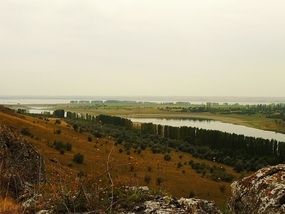
Ciuhur River
"Ciuhur River" is the river that flows through the village of Văratic, but has its sources near the small town of Ocnita and carries its waters on the territory of the districts of Ocnita, Edinet, Riscani. It flows into the Prut River north of Costești. Its length is 90 km.
Read more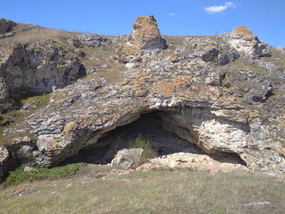
Căsoaia (Big House)
"Căsoaia" (Big House) is the name of one of the two caves on the left side of the "Cascade of Snakes". It is unique in the northern region of the country. The surroundings are fantastic, rich in flora and fauna, especially snakes.
Read moreFigures
Constantin Tarita was born on September 19, 1954, in the village of Văratic, Riscani.
He is Professor, PhD in Geo-ecology and Ecological Chemistry at the Free University of Berlin, Germany. He is the author of many environmental standards, regulations as well as analytical methods for environmental research. He is also active at the German Federal Environment Agency, where he is Deputy Head of Department - Ecology and Soil Quality.
Anatol Șalaru (b. 7 February 1962, Văratic village, Rîșcani district), politician from the Republic of Moldova, member of the first Parliament of the Republic of Moldova between 1990-1994, former Minister of Transport and Road Infrastructure (2009-2013), Vice President of the Liberal Party, the successor to the Reform Party, which he led from 1993-1997. He is the founder of the "Alexei Mateevich" Cenacle, a forum of free and national ideas created in the waning years of the Soviet Union and the beginning of restructuring.
Ion Șalaru, born on August 26, 1963, in a peasant family, Victor and Liuba Șalaru from Văratic. He is a medical hygienist and currently works as Deputy Director at the National Agency for Public Health. He has completed his training at the University of Melbourne, Australia (2021), Lugano Summer School in Public Health (2020), Geneva Graduate Institute: Health Diplomacy (2014), John Hopkins Bloomberg School of Public Health: Tobacco Control Leadership Program (2013), Braun School of Public Health (20120, etc.).
Ion Apostol was born on August 21, 1962 to Gheorghe and Nina Apostol. From an early age he loved books and music. He took accordeon and flute lessons, and at school he showed a special attraction to literature and English. He is a foreign language teacher and director of "OPTIMAL Impex" Ltd., Member of the Moldovan Parliament in 2013-2019 list of candidates of the Liberal Party.
Vladislav Gribincea - born on April 22, 1980, in Văratic village, r. Rîșcani. Mr Gribincea graduated from the Faculty of Law, State University of Moldova. In 2005, he graduated from the Chevening Programme at the University of Nottingham, UK. He has been President of the Moldovan Legal Resource Centre since 2010, and has been active in the non-governmental sector since 2002. His expertise is mainly in justice reform and the European Convention on Human Rights. He is a member of the Union of Lawyers of the Republic of Moldova. Since 2002, he has been representing plaintiffs before the European Court of Human Rights and in strategic litigation at national level. He is a trainer at the National Institute of Justice of the Republic of Moldova. He is the author of numerous publications in the field of the European Convention on Human Rights and the independence and efficiency of justice.
Vasile Șelaru - biologist, scientific field: algology, hydrobiology, agricultural biotechnology, protection and rational use of plant resources. PhD in biological sciences (1972), university professor (1975), corresponding member of the Academy of Sciences of Moldova (1995). Vasile Șelaru is well known in the world of specialists in the natural sciences, primarily because of his fundamental contribution to the development of algology, a field to which he devoted all his talent, enthusiasm and dedication.
Bishop Siluan Șalari was born on April 19, 1977, in the village of Văratic, Riscani district. After graduating from the local gymnasium, he became a brother at the Saharna monastery. Here he received the monkhood and the priesthood. He studied by correspondence at the Theological Seminary of the Noul Neamț monastery. Since 2001 he has been ordained as archimandrite at Curchi Monastery.
In 2002, Father Siluan was appointed head of the Department of Monasteries and Monastic Life within the Metropolitanate of Chisinau and all of Moldova. On 30 December 2010, by a decree of His Eminence Vladimir, Orthodox Church of Chisinau and All Moldova, Archimandrite Siluan, abbot of Curchi monastery and exarch of monasteries in Moldova, was appointed protopope of Orhei.
In 2012, Archimandrite Siluan (Șalari), exarch of the monasteries of Moldova, was conferred the honorary title of Man Emeritus by presidential decree.
Marcela Benea, poet, born on June 4, 1948 in the village of Văratic, Riscani district. In 1972 she graduated from the State University of Moldova, Faculty of Philology. She was a teacher of Romanian language and literature (1972-1974), editor at the publishing house "Cartea Moldovenească" (1975-1976), literary editor at the Chisinau Philharmonic (1976-1977) and senior editor at the State Committee for Television and Radio Broadcasting (1977-1986).
Since 1966 she collaborated with the publications "Cultura", "Moldova", "Nistru", "Literatura și Arta", "Tinerimea Moldovei", "Glasul Națiunii", "Contrafort", "Revista Română" (Iași), "Litere" (Târgoviște), "Hyperion" (Botoșani), "Beletra Almanaco" (USA), "Lichtungen" (Vienna, Austria), etc.
In 1973, she made her publishing debut in the volume "Among hundreds of masts", followed by several books. She was awarded the Romanian Writers' Union Prize, Chisinau branch, first prize at the Moscow Poetry Television Festival and in 2008 - the Moldovan Writers' Union Prize.
Marcela Benea's lyrics have been translated into Russian, Ukrainian, Bulgarian, Latvian, Armenian, Georgian and German.
Video presentation
In the following video presentation, you will be invited to discover the beauty of the banks of the Prut River in the Republic of Moldova. This picturesque area is known for its idyllic landscapes, where the river Prut flows quietly through the hills
photos by Iurie Sveț – www.hikeme.club


 ro
ro
 ru
ru

